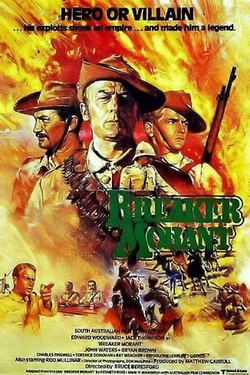SUMMARY: "Breaker
Morant" is the true story of Lt. Harry "Breaker" Morant (Edward
Woodward) who, with two comrades Lt. Handcock (Bryan Brown) and Lt. Witton (Lewis Fitz-Gerald), is put on
trial for killing prisoners and a German missionary during the Second Boer War.
They become pawns in an unpopular British war.
BACK-STORY: “Breaker Morant” was released
in 1980 and was the first of three films made in Australia that marked the
arrival of Australian cinema as a force in war movies. The other two films were
“Gallipolli” (1981) and “The Lighthorsemen” (1987). The film was directed by
Bruce Beresford, has an all-Australian cast, and was shot in Australia. It is
based on the play by the same name which tells the story of the court-martial
of Harry “Breaker” Morant, a well known warrior/poet. It was a box office
success in America and was nominated for an Oscar for Best Adapted Screenplay.
TRIVIA: Wikipedia, imdb, Criterion essay
1. It is based on a play by Kenneth Ross.
2. It was voted Best Picture by the Australian Film Institute.
3. It was one of the first of the Australian New Wave that continued with “Gallipoli” one year later. These war movies, which included “The Lighthorsemen”, were typified by manliness, comradeship in dilemmas, and anti-It
4. Considering its anti-British vibe, it premiered at the Royal Charity Film Premiere in London. Prince Charles attended.
5. The “Rule .303” refers to the .303 caliber bullet used in their rifles.
6. The poem at the end is “Mafeking” by Sir Alfred Austen, a British poet Laurette.
7. Breaker was a reference to a breaker of horses.
8. The Morant poems were: 1. “At the River’s Crossing” – in the jail cell 2. “Westward Ho!” - the night before the execution 3. “Butchered to Make a Dutchman’s Holiday” – in the execution scene. The song he sings was based on his poem “At Last”.
9. It is a good companion to “Paths of Glory”
and “King and Country”.
Belle and Blade = 5.0
Brassey’s =
3.0
Video Hound =
5.0
War Movies =
3.8
Military History = #91
Channel 4 =
#78
Film Site = yes
101 War Movies
= no
Rotten Tomatoes = no
OPINION: I’ll go out on a limb and
proclaim that this is the best movie ever made about the Boer War. You get a
feel for the war, although looking it up in an encyclopedia will help with the
big picture. It also helps if you are familiar with the Vietnam War because you
can transpose that war for much of ”Breaker Morant”. The closing speech by
Thomas could have been given by Lt. Calley’s lawyer at his My Lai trial.
“Breaker Morant” is one of the great anti-war movies. I recently got into a
debate about whether all war movies are anti-war. Realistically, they should
be, but actually a lot glorify war without showing any of the seamier side. The
themes of prisoner abuse, never-ending guerrilla war, and scape-goating lower
echelon soldiers resonate today. I sure hope this movie is being shown at West
Point these days! It would not hurt for cadets to be told to focus on the “war
corrupts good men” theme. Officers coming out of West Point are in many ways
our “Breaker” Morants. It is the second best “soldiers on trial as scape-goats
for command decisions” movie. After watching “Breaker Morant”, pair it off with
its sister – “Paths of Glory”.
The only problem I have with the movie is if you really think about it, Morant
was guilty of war crimes. Before the death of Hunt, he was clearly conflicted
about the verbal orders from higher-up to kill prisoners. When he takes over,
he did not have to obey those orders even if he thought they were official and
it is clearly implied he became vengeance-minded. It is one of the strengths of
the movie that even the death of the missionary seems like a railroaded charge
when, of course, it was an egregious breech of the rules of war. How many in
the audience see it as it is accurately depicted – an assassination of a priest
for choosing the wrong side and for potentially informing on a war crime?
This is a great movie. The scenery is
beautiful as Australia stands in for the unbroken horizons of the Transvaal.
The acting is fantastic. In the courtroom scenes, watch the facial expressions
of the actors. You can read a lot from those faces! Woodward is seething, Brown
is roguish, Fitz-Gerald is naïve, and Thompson is outraged. Denny (the head of
the tribunal) and Kitchener are appropriately hissable.
As a history lesson and a lesson in military ethics, the movie is valuable and
should be viewed by a public that is at war in a war similar to the Boer War.
Let’s say, Afghanistan. Clearly the film should be mandatory viewing for
soldiers involved in a counter-insurgency situation and for the leaders who are
fashioning that counter-insurgency policy.

This is a great movie, one of my favorites! I agree with twining it with Paths of Glory, another great movie.
ReplyDeleteSteve Ellis